The exercise for participle and absolute construction 分词结构与独立主格
语法:独立主格结构(福建高考英语必考难点之一 )
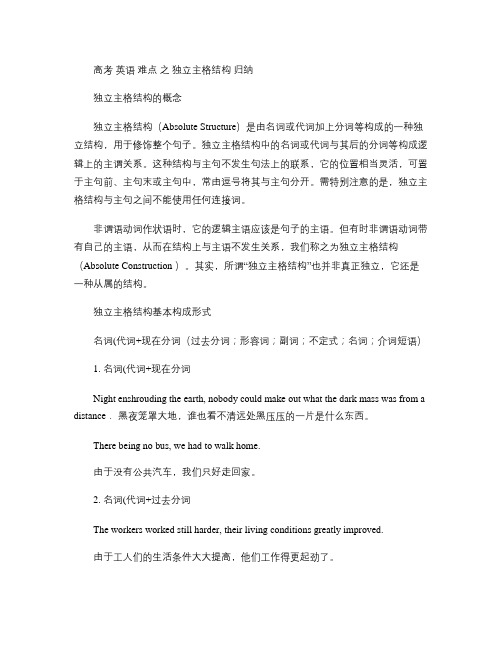
高考英语难点之独立主格结构归纳独立主格结构的概念独立主格结构(Absolute Structure)是由名词或代词加上分词等构成的一种独立结构,用于修饰整个句子。
独立主格结构中的名词或代词与其后的分词等构成逻辑上的主谓关系。
这种结构与主句不发生句法上的联系,它的位置相当灵活,可置于主句前、主句末或主句中,常由逗号将其与主句分开。
需特别注意的是,独立主格结构与主句之间不能使用任何连接词。
非谓语动词作状语时,它的逻辑主语应该是句子的主语。
但有时非谓语动词带有自己的主语,从而在结构上与主语不发生关系,我们称之为独立主格结构(Absolute Construction )。
其实,所谓“独立主格结构”也并非真正独立,它还是一种从属的结构。
独立主格结构基本构成形式名词(代词+现在分词(过去分词;形容词;副词;不定式;名词;介词短语)1. 名词(代词+现在分词Night enshrouding the earth, nobody could make out what the dark mass was from a distance.黑夜笼罩大地,谁也看不清远处黑压压的一片是什么东西。
There being no bus, we had to walk home.由于没有公共汽车,我们只好走回家。
2. 名词(代词+过去分词The workers worked still harder, their living conditions greatly improved.由于工人们的生活条件大大提高,他们工作得更起劲了。
He was listening attentively in class, his eyes fixed on the blackboard.他上课专心听讲,眼睛紧盯着黑板。
3. 名词(代词+不定式在“名词/代词+动词不定式”结构中,动词不定式和它前面的名词或代词如果存在着逻辑上的主谓关系,动词不定式则用主动的形式;如果是动宾关系,则用被动形式。
独立主格结构(AbsoluteStructure)知识点.
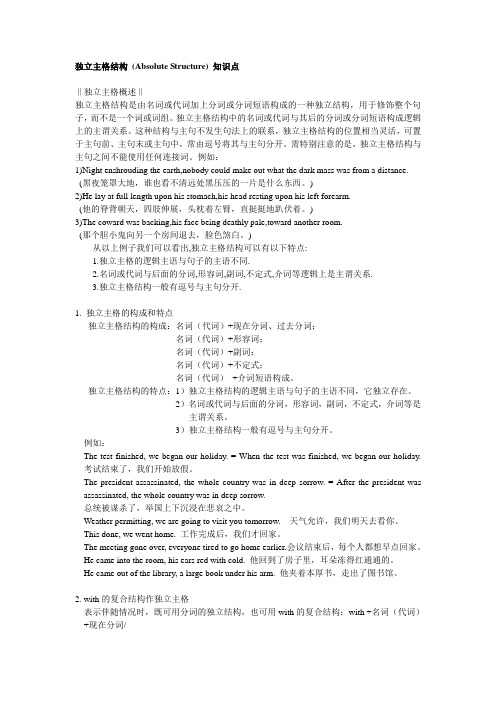
独立主格结构(Absolute Structure)知识点
‖独立主格概述‖
独立主格结构是由名词或代词加上分词或分词短语构成的一种独立结构,用于修饰整个句子,而不是一个词或词组。独立主格结构中的名词或代词与其后的分词或分词短语构成逻辑上的主谓关系。这种结构与主句不发生句法上的联系,独立主格结构的位置相当灵活,可置于主句前、主句末或主句中,常由逗号将其与主句分开。需特别注意的是,独立主格结构与主句之间不能使用任何连接词。例如:
2)名词或代词与后面的分词,形容词,副词,不定式,介词等是主谓关系。
3)独立主格结构一般有逗号与主句分开。
例如:
The test finished, we began our holiday. = When the test was finished, we began ourholiday.考试结束了,我们开始放假。
如果不会判断独立结构作状语的形式,不妨将句子改为条件句,例如本句改为If weather
permits, we'll go out for a walk.然后将if去掉,再将谓语动词改为非谓语动词即可。
1)Night enshrouding the earth,nobody could make outwhat the dark mass was from adistance.
(黑夜笼罩大地,谁也看不清远处黑压压的一片是什么东西。)
2)He lay at full length upon his stomach,his head resting upon his left forearm.
独立主格专题讲解
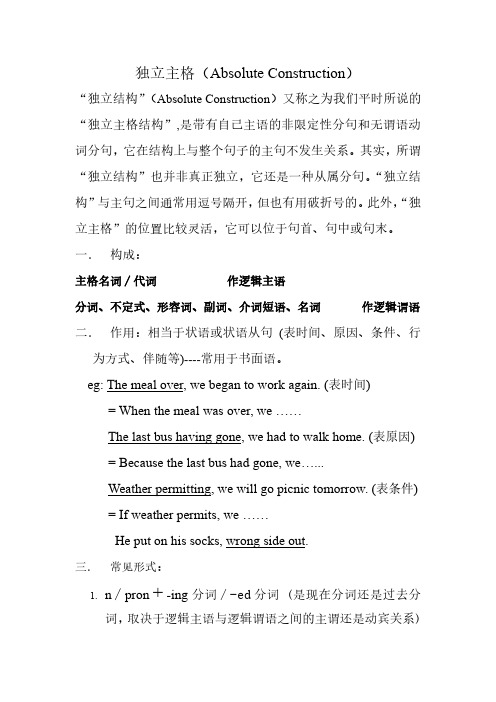
独立主格(Absolute Construction)“独立结构”(Absolute Construction)又称之为我们平时所说的“独立主格结构”,是带有自己主语的非限定性分句和无谓语动词分句,它在结构上与整个句子的主句不发生关系。
其实,所谓“独立结构”也并非真正独立,它还是一种从属分句。
“独立结构”与主句之间通常用逗号隔开,但也有用破折号的。
此外,“独立主格”的位置比较灵活,它可以位于句首、句中或句末。
一.构成:主格名词∕代词作逻辑主语分词、不定式、形容词、副词、介词短语、名词作逻辑谓语二.作用:相当于状语或状语从句(表时间、原因、条件、行为方式、伴随等)----常用于书面语。
eg:The meal over,we began to work again.(表时间) =When the meal was over,we……The last bus having gone,we had to walk home.(表原因)=Because the last bus had gone,we…...Weather permitting,we will go picnic tomorrow.(表条件)=If weather permits,we……He put on his socks,wrong side out.三.常见形式:1.n∕pron+-ing分词∕-ed分词(是现在分词还是过去分词,取决于逻辑主语与逻辑谓语之间的主谓还是动宾关系)eg:Night falling,we hurried home.The work done,they went home.All things considered,I think I ought to award the job to Smith.2.n∕pron+不定式eg:So many people to help him,he is sure to succeed.Please finish the first exercise in class,the second to be done after class.3.n∕pron+adj.∕adv.eg:The students were listening to the teacher,their eyes wide open.He pulled on his shirt,wrong side out.4.n∕pron+介词短语eg:The old man sat on the chair,pipe in hand.(with a pipe in his hand)He went out of the room,tears in eyes.(with tears in his eyes)注意:“独立结构”均可以变为由with引导的介词短语,而表示否定意义的“独立结构”则可以转换为由without引导的介词短语。
(完整word版)专四语法之独立主格
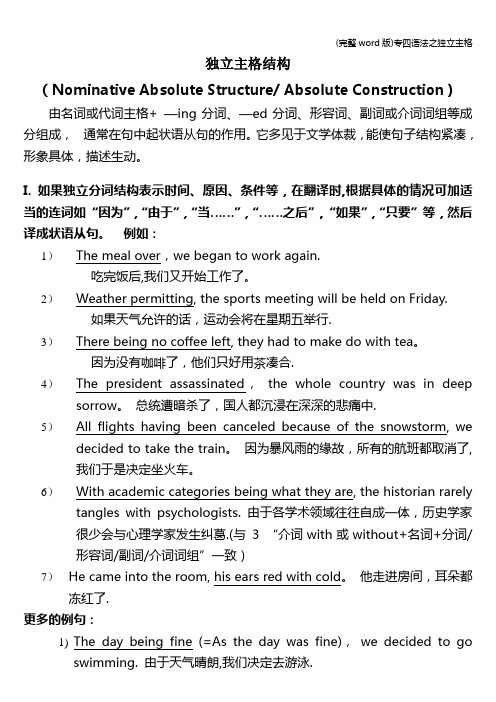
独立主格结构(Nominative Absolute Structure/ Absolute Construction)由名词或代词主格+ —ing分词、—ed分词、形容词、副词或介词词组等成分组成,通常在句中起状语从句的作用。
它多见于文学体裁,能使句子结构紧凑,形象具体,描述生动。
I. 如果独立分词结构表示时间、原因、条件等,在翻译时,根据具体的情况可加适当的连词如“因为”,“由于”,“当……”,“……之后”,“如果”,“只要”等,然后译成状语从句。
例如:1)The meal over,we began to work again.吃完饭后,我们又开始工作了。
2)Weather permitting, the sports meeting will be held on Friday.如果天气允许的话,运动会将在星期五举行.3)There being no coffee left, they had to make do with tea。
因为没有咖啡了,他们只好用茶凑合.4)The president assassinated,the whole country was in deep sorrow。
总统遭暗杀了,国人都沉浸在深深的悲痛中.5)All flights having been canceled because of the snowstorm, we decided to take the train。
因为暴风雨的缘故,所有的航班都取消了,我们于是决定坐火车。
6)With academic categories being what they are, the historian rarely tangles with psychologists. 由于各学术领域往往自成一体,历史学家很少会与心理学家发生纠葛.(与3 “介词with或without+名词+分词/形容词/副词/介词词组”一致)7)He came into the room, his ears red with cold。
Absolute Construction
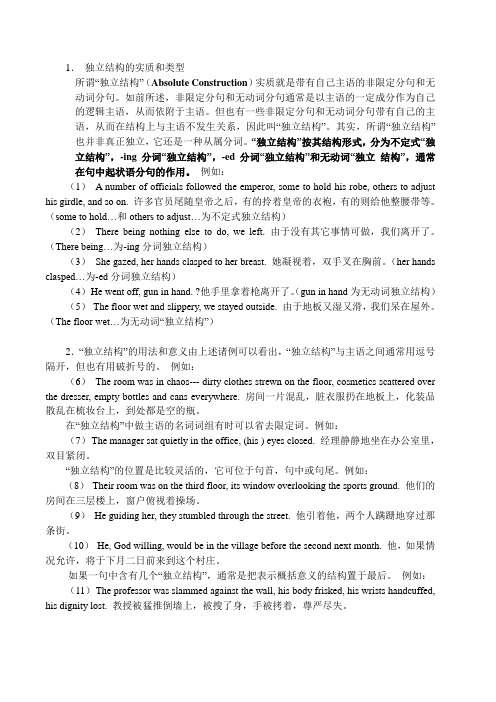
1.独立结构的实质和类型所谓“独立结构”(Absolute Construction)实质就是带有自己主语的非限定分句和无动词分句。
如前所述,非限定分句和无动词分句通常是以主语的一定成分作为自己的逻辑主语,从而依附于主语。
但也有一些非限定分句和无动词分句带有自己的主语,从而在结构上与主语不发生关系,因此叫“独立结构”。
其实,所谓“独立结构”也并非真正独立,它还是一种从属分词。
“独立结构”按其结构形式,分为不定式“独立结构”,-ing分词“独立结构”,-ed分词“独立结构”和无动词“独立结构”,通常在句中起状语分句的作用。
例如:(1)A number of officials followed the emperor, some to hold his robe, others to adjust his girdle, and so on. 许多官员尾随皇帝之后,有的拎着皇帝的衣袍,有的则给他整腰带等。
(some to hold…和others to adjust…为不定式独立结构)(2)There being nothing else to do, we left. 由于没有其它事情可做,我们离开了。
(There being…为-ing分词独立结构)(3)She gazed, her hands clasped to her breast. 她凝视着,双手叉在胸前。
(her hands clasped…为-ed分词独立结构)(4)He went off, gun in hand. ?他手里拿着枪离开了。
(gun in hand为无动词独立结构)(5)The floor wet and slippery, we stayed outside. 由于地板又湿又滑,我们呆在屋外。
(The f loor wet…为无动词“独立结构”)2.“独立结构”的用法和意义由上述诸例可以看出,“独立结构”与主语之间通常用逗号隔开,但也有用破折号的。
高中英语 独立主格结构精讲(配套练习和答案)
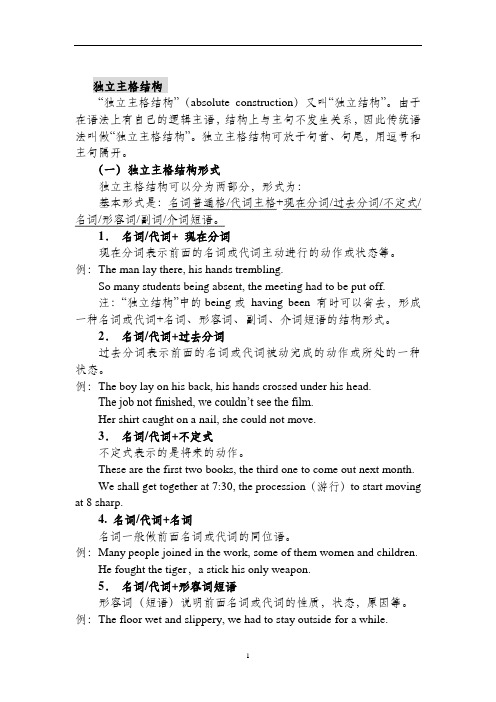
独立主格结构“独立主格结构”(absolute construction)又叫“独立结构”。
由于在语法上有自己的逻辑主语,结构上与主句不发生关系,因此传统语法叫做“独立主格结构”。
独立主格结构可放于句首、句尾,用逗号和主句隔开。
(一)独立主格结构形式独立主格结构可以分为两部分,形式为:基本形式是:名词普通格/代词主格+现在分词/过去分词/不定式/名词/形容词/副词/介词短语。
1.名词/代词+ 现在分词现在分词表示前面的名词或代词主动进行的动作或状态等。
例:The man lay there, his hands trembling.So many students being absent, the meeting had to be put off.注:“独立结构”中的being或having been 有时可以省去,形成一种名词或代词+名词、形容词、副词、介词短语的结构形式。
2.名词/代词+过去分词过去分词表示前面的名词或代词被动完成的动作或所处的一种状态。
例:The boy lay on his back, his hands crossed under his head.The job not finished, we couldn’t see the film.Her shirt caught on a nail, she could not move.3.名词/代词+不定式不定式表示的是将来的动作。
These are the first two books, the third one to come out next month.We shall get together at 7:30, the procession(游行)to start moving at 8 sharp.4. 名词/代词+名词名词一般做前面名词或代词的同位语。
例:Many people joined in the work, some of them women and children.He fought the tiger,a stick his only weapon.5.名词/代词+形容词短语形容词(短语)说明前面名词或代词的性质,状态,原因等。
英语语法学习:最新独立主格结构知识点小结
英语语法学习:最新独立主格结构知识点小结
非谓语动词作状语时,它的逻辑主语应该是句子的主语。
但有时非谓语动词带有自己的主语,从而在结构上与主语不发生关系,我们称之为独立主格结构(Absolute Construction)。
独立主格结构自身不是语句,在语句中做状语,表時间、缘由、条件、随着、目的及状况等。
一、独立主格结构有8种基本句型如下:
1.“名词/代词+不定式”结构
由不定式构成的独立主格结构往往表示还未发生的动作或状态,在句中常作原因状语,偶尔作条件状语。
动词不定式和它前面的名词或代词如果存在着逻辑上的主谓关系,动词不定式则用主动的形式;如果是动宾关系,则用被动形式。
例如:
His friends to come tonight,he is busy preparing the dinner.
他的朋友今晚要来,他正忙着准备晚餐。
No one to wake me up,I might be late for the first class.
如果没人叫醒我,我会错过第一节课的。
The four of us agreed on a division of labor, each to translate a quarter of the book.
我们四人同意分工干,每人翻译全书的四分之一。
Many trees, flowers, and grass to be planted, our newly-built school will look even more beautiful. 种上许多的树、花和草后,我们新建的学校看上去将更美。
独立主格
2)condition 表示条件
Weather permitting, we will go outing this Sunday. 天气可以的话,我们本周日出去郊游。 Time permitting, we will pay a visit to him before we leave. 如果时间允许的话,我们离开之前去看看他。
3. done 过去分词
The famous star surrounded by a large crowd, the bodyguards had trouble keeping a distance between him and the fans. 由于一大群人围着这个明星,保镖很难把他和那些 狂热的仰慕者分开。 The girl listened to the story silently, her eyes filled with tears. 女孩眼里含着泪水,静静地听完故事。
独立主格简介 从功能上来看,独立主格部分在句中作状语, 可以表示原因、条件、结果或伴随状态 从语处指独立主格部分) 和主句的主语完全不同,但是在小句和主句 之间没有任何关联词。 独立主格结构主要有两种形式,一是含有小 句(小句中有主语和动词的非谓语形式)的 独立主格结构;另一种是with或without后接 小句的形式。
The teacher lectured on this boring topic without any emotion, quite a number of students already fast asleep when he finished. 这个老师就这个无聊的话题作讲座时不带任何激情, 等他讲完了很多学生已经睡得很香了。 The war lasted 8 years, millions of people killed or wounded. 战争延续了8年,死伤数百万人。
【英语语法】独立主格结构
A
• 2)_______Sunday, the library doesn't open. A.Being B.There being C.It being D.Having been
C
2. 名词/主格代词+过去分词(表示被动和已完成)
• 名词/主格代词与过去分词之间的动宾关系。
The problems solved (= As the problems were solved), the quality has been improved.
他们道别后,一个回了家,一个去了书店。
4. 名词/主格代词+形容词(说明名词或代词的性质,特征或所处的状态)
An air accident happened to the plane, nobody alive.
那架飞机遭遇了空难,无bsent, the meeting had to be called off.
A
D
3. 名词/主格代词+不定式(表示将要发生的动
作)
• 名词/主格代词与不定式之间是主谓关系,且强调的是一次具体 性的动作。如: He is going to make a model plane, some old parts to help.
借助于一些旧零件,他要做一个飞机模型。
They said good-bye to each other, one to go home, the other to go to the bookstore.
With的复合结构作独立主格
表伴随时,既可用分词的独立结构,也可用with的复合结构。 基本形式:with +名词(代词)+现在分词/过去分词/形容词/副词/不定 式/介词短语 He stood there, his hand raised. = He stood there, with his hand raise. The murder was brought in, with his hands ___ behind his back. A. tie B. tying C. be tied D. tied
高考独立主格讲解及练习
高考独立主格讲解及练习高中英语语法讲义-------独立主格结构一、概述独立主格结构又叫独立结构(absolute construction),由名词/主格代词+ 现在分词(或过去分词、不定式、名词、形容词、副词、介词短语)构成。
在语法上是一个独立的短语,不是句子,在意思上依附于整个句子。
具有以下特点:(1)在句子中作状语,表示时间、原因、条件、让步、行为方式或伴随情况。
(2)可置于句首,也可放在句尾。
(3)主要用于书面语。
(4)它的逻辑主语与主句的主语不同,不指同一人或同一物。
(5)be动词在独立主格结构中一般转化为being。
二、独立主格结构的构成1.名词或主格代词+名词在这种结构中,独立主格结构中的名词与前面的名词或代词之间在逻辑上有主系表关系,在句子中主要作伴随、原因等状语或作进一步说明。
此结构也可写成:名词或代词+being +名词,其中being 是非谓语(系)动词,往往省略,但being的逻辑主语是人称代词时,being不能省略。
名词的逻辑主语为人称代词时,应用主格形式。
①He fought against the thief, a stick (being) his only weapon (= and a stick was his only weapon).他和这个贼打斗,一根棍子是他唯一的武器。
② He has translated the whole book into English, an English-Chinese dictionary (being) his tool.(=and an English-Chinese dictionary was his tool.)用一本英汉字典作工具,他把整本书翻译成了英语。
③It being Sunday (=As it was Sunday), I didn’t go to school.(句中的being不能省略)因为是星期天,我没有上课。
- 1、下载文档前请自行甄别文档内容的完整性,平台不提供额外的编辑、内容补充、找答案等附加服务。
- 2、"仅部分预览"的文档,不可在线预览部分如存在完整性等问题,可反馈申请退款(可完整预览的文档不适用该条件!)。
- 3、如文档侵犯您的权益,请联系客服反馈,我们会尽快为您处理(人工客服工作时间:9:00-18:30)。
The exercise for participle and absolute construction 1. ________ cold and lonely, I went downstairs and sat in front of television _____ to read. A. Felt… pretending B. Feeling… pretending C. To feel… to pretend D. Feeling… to pretend 2. _____ red-handed, the thief asked the police for mercy. A. To catch B. Caught C. To be caught D. Catching 3. _____ the office, the foreign visitors were shown round the teaching building. A. Having shown B. Showing C. Had shown D. Having been shown 4. _______ in the particular heavy shower, he walked into an expensive shop. A. Having caught B. To be caught C. Having been caught D. To being caught 5. _____ black and blue, the boy began to fight against the boss. A. Beating B. Beaten C. To be beaten D. To beat 6. _____ from space, the earth looks like a “ blue planet.” A. Seeing B. To see C. Seen D. Having seen 7. ______ that the teacher was not in, he went back. A. To find B. Find C. To have found D. Finding 8. On his way back home, he found his wallet _____ . A. to miss B. missing C. miss D. missed 9. While having our dinner, ______. A. the door bell rang B. we heard the door bell rang C. we heard the door bell ringing D. the door bell was heard to ring 10. Before she came to London, she had never heard a single English word_____. A. speaking B. spoken C. to speak D. speak 11. Looking out of the window, _______ . A. I saw students played football B. Students were seen to play football C. I saw students playing football D. Students were seen 12. ______ a hot day, John decided to go for a swim. .A What B. Being C. Having been D. It being 13. ______ the housework, Mary begun watching TV. A. Being finished B. To have finished C. Finishing D. Having finished 14. ______ at in this way, the situation doesn’t seem so terrible. .A Looking B. If looking C. Being D. Looked 15. All the teachers and students have been invited to attend the lecture_____ next Friday. A. held B. to be held C. hold D. holding 16. There are a number of problems_______ at the next meeting. A. are being discussed B. to have to discuss C. to be going to discuss D. to be discussed 17. He was caught again _____ into that house. A. steal B. stole C. stealing D. stolen 18. The damage _____ about by the fire was reduced to a minimum. .A bringing B. brought C. to be brought D. being brought 19. The birds ______ in the trees filled the air with music. A. sing B. sung C. to sing D. singing 20. ______ , your composition is full of mistakes. A. Writing in haste B. Written in haste C. Being written in haste D. To be written in haste 21. ______ on the road, the car was stopped. A. Having seen a bomb B. Seeing a bomb C. The driver seeing a bomb D. The driver had seen a bomb 22. When _____ , John did not reply. A. he asked what his name was B. asking what John’s name was C. he asking what his name was D. asked what his name was 23. _____ in vegetable oil, potatoes are very delicious in many northern countries. A. Fried B. To fry C. Frying D. Having fried 24. ______ a crowd of spectators, she felt nervous. A. To be watching B. Being watched by C. Having been watching D. Having watched by 25. The house _____ will be our new laboratory. A. to build B. building C. having built D. being built 26. _______ five laps around the track, Kenny was too tired to attend his German class. A. To run B. After running C. He ran D. Running 27. The matter_____ , I felt quite satisfied with the result. A. have settled B. being settled C. was settled D. settled 28. Once ______ oxygen, the brain dies. A. deprived of B. depriving of C. to deprive D. to be deprived 29. The grass will grow more quickly ____ regularly. A. if watering B. if to water C. watered D. if watered 30. Weather ______ , we’ll go out for a trip. A. will permit B. permits C. permitting D. permitted 31. Everything ______ into consideration, your paper was well written. A. taking B. be taken C. taken D. having taken 32__________ , we went swimming. A. Being a hot day B. Due to a hot day C. The day being hot D. It was hot day 32. ________ no one at home, he left the house in a bad temper. A. Had found B. Finding C. To have found D. He found 33. With a lot of English problems _______ , Jack went to bed. A. solve B. solving C. solved D. to solve 34. ______ , the result is satisfactory. .A All things are considered B. All things considered C. All things are considering D. Considering all things 35. Jane ran back to the kitchen, eggs _____ in her hands. A. were held carefully B. were holding carefully C. were carefully held D. held carefully 36. __________ , the meeting will be held as scheduled. A. Weather permitted B. Weather permitting C. Weather should permit D. Weather permits 37. _______ a fine day, we decided to go out on a picnic. A. Having been B. Be C. What D. It being 38. His parents ______ last week, the child has no one to look after him. A. having died B. being died C. dead D. having dead 39. He entered the room, his nose________ . A. is red with cold B. cold with red C. red with cold D. is cold with red 40. Society_____ the rule, we mush conform. A. has made B. have made C. having made D. that has made 41. So many students ______, the meeting had to be put off. A. not being absent B. being absent C. are absent D. be absent
